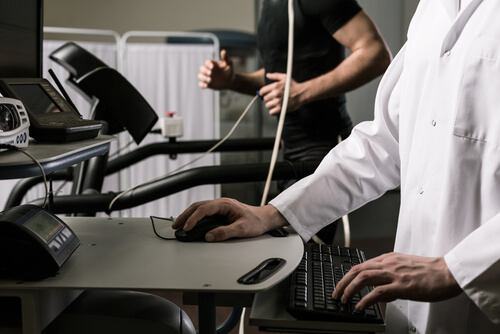Should I Have A Stress Test?
Posted by: Men's Health Boston in Men's Health on March 30, 2021

Do you have symptoms of a heart problem?
Do you have shortness of breath, chest pain, dizziness, irregular or heavy heartbeat, especially while exercising? Do you have a history of heart disease, diabetes, or other heart risks?
Are you considering beginning an exercise program while you’re at risk for heart disease? If you answered yes to any of these questions, you should consider a stress test.
Keep reading to learn more about stress tests, what to expect during one, and who should get a stress test!
What Is a Stress Test?
A stress test is an exercise test given by a doctor. Doctors use stress tests to detect heart disease, like blocked arteries. They can also use stress testing to see if medication for treating heart disease is working.
The doctor and their staff will put you through a full exercise program. They will watch your heart rate, blood pressure, and cardiac electrical response throughout. The exercise is most often accomplished on a treadmill and sometimes on a stationary bike. The program increases in intensity every few minutes and is designed to tire you out quickly, often after 5-15 minutes.
What Can I Expect During a Stress Test?
A stress test is an exercise test, so you should expect to move when you have one. During the test, you will have electrodes attached to your chest and arms.
The electrodes measure the electrical signals from your heart while you are exercising. These electrodes go to an electrocardiography machine.
The electrocardiography machine will produce an electrocardiogram, also known as an EKG. An EKG represents the signals from your heartbeat.
The stress test is designed to increase your heart rate and blood pressure while you will go through a three-step exercise routine. The three steps are warm-up, peak activity, and recovery.
Stress tests are usually done on a treadmill or stationary bike. For people who can’t use a treadmill or bike, there are alternatives, like arm machines.
If you are unable to exercise, the doctor might suggest a chemical stress test. This uses medication injected to mimic exercise that makes your body think it is exercising. Side effects of chemical stress tests include shortness of breath, increased heart rate and blood pressure, and headaches.
Who Should Get a Stress Test?
Candidates for stress tests are patients at risk for heart disease. Or, if you are having certain symptoms while exercising your doctor may recommend a stress test. Heart symptoms could include shortness of breath, chest pain, dizziness, or irregular heartbeat.
Stress tests are also used to track the effectiveness of heart disease treatments. Another common reason for having a stress test is if you have or are at risk of heart disease, and are beginning an exercise program.
A stress test will help determine what level of exercise is appropriate for you and can help your cardiologist determine a good routine for you.
How Do You Prepare For a Stress Test?
Your doctor may ask you to avoid caffeine, smoking, and eating before the test. Most often, stress tests are performed while taking all your current medication. Occasionally, the doctor may tell you to stop taking certain medications before the test.
Do not stop taking any medications unless your doctor tells you to do so. If you use an inhaler make sure your doctor knows about it, and be sure to bring it with you.
You may or may not be able to use it before the test. Follow your doctor’s instructions.
What Should You Do After a Stress Test?
When the test is over, the staff at Men’s Health Boston will watch your blood pressure and heart rate as you “cool down.” They want to see how long it takes to return to your baseline numbers. Quite often, an imaging modality such as ultrasound (aka echocardiogram) will be performed before and immediately after exercise. This can help the doctor further exclude any heart problem in certain circumstances.
After the stress test is completed, the doctor will examine your results. This analysis will determine your next steps.
They could recommend a certain exercise program or more tests.
It will be up to your doctor to tell you your next steps after an exercise stress test. They will give you a plan of action.
Wondering if a stress test is right for you? Schedule a consultation with the professionals at Men’s Health Boston today!
Don’t go another day without being confident in the health of your heart!

